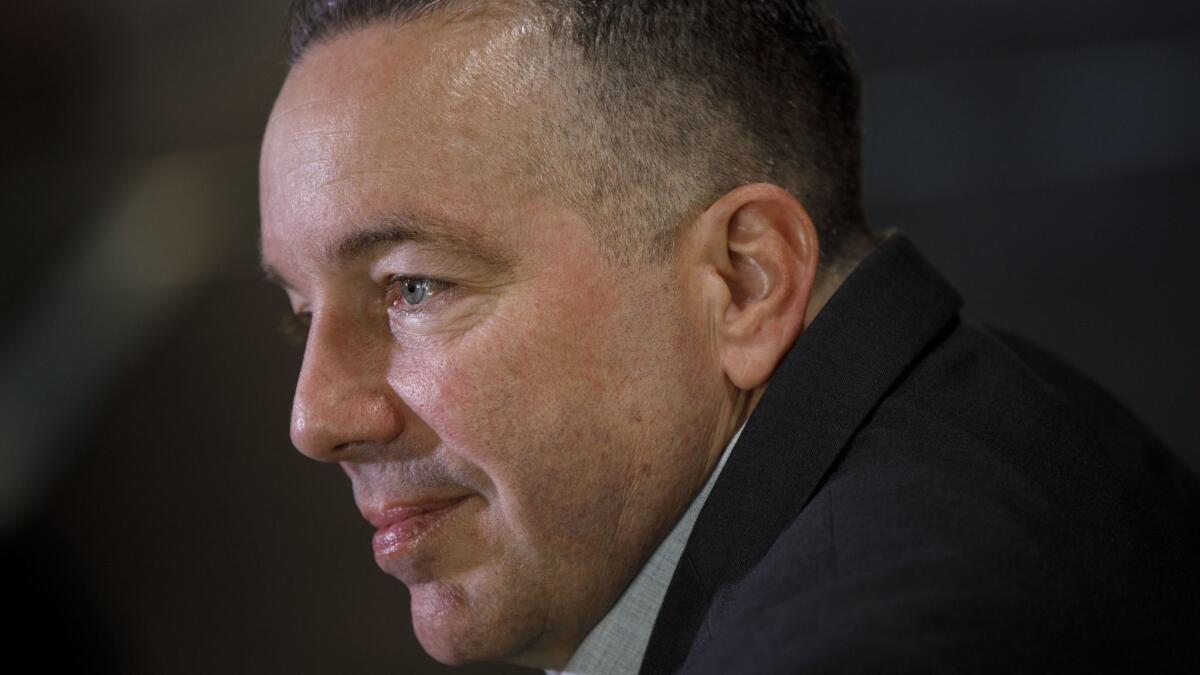Editorial: Sheriff-elect Alex Villanueva is already planning a troubling change on deputy discipline oversight

- Share via
Los Angeles Police Chief William J. Bratton sent an unmistakable and very public message in 2003 when he appointed renowned criminal defense attorney Gerald Chaleff to be his special assistant for constitutional policing in the aftermath of the LAPD’s Rampart corruption scandal. That message began with the job title: constitutional policing. It was a signal that Bratton recognized that some officers violated people’s rights in the course of conducting searches and making arrests, and that fixing the problem would be a complex and ongoing challenge that required expertise from outside the uniformed chain of command.
Since that time, Bratton’s example has been followed by police chiefs and sheriffs around the nation, including Los Angeles County Sheriff Jim McDonnell, who in 2015 appointed two constitutional policing advisors — civilian attorneys who counseled and reported directly to him.
The move demonstrated a significant shift in the department after the administration of Sheriff Lee Baca, who was sentenced to three years in prison for his role in covering up decidedly unconstitutional practices by jail deputies, such as brutally beating inmates.
Creating the positions was McDonnell’s clearest signal that he planned to lead the department in a new direction.
Eliminating those positions also sends a message — and it’s a very bad one.
After defeating McDonnell in the Nov. 6 election, Alex Villanueva announced that he intended to scrap the two constitutional policing slots once he is sworn in as sheriff Monday. That pleased his supporters in the deputies union, which sees the civilian advisors as meddlers. But the move is sending a chill through the community of reformers who keep a wary eye out for any backsliding in the still-troubled but improving Sheriff’s Department.
Villanueva’s approach is puzzling, at the very least.
Villanueva later said he would appoint a new set of advisors with more limited roles. McDonnell’s advisors — Diana Teran and Sergio Perez — are being transferred to the office of Inspector General Max Huntsman.
But Huntsman’s unit is very much outside the department and reports not to the sheriff but to the L.A. County Board of Supervisors, whose authority over sheriff’s matters is limited. The department is best served by civilian advisors with outside perspectives but inside positions, warning the sheriff when his policies, his deputies, his command staff — or the sheriff himself — are headed toward ethical or legal trouble.
That’s what constitutional policing advisors do. In the often insular world of law enforcement, where a bureaucracy of badges becomes set in its ways and top commanders tend to just say “yes” to the sheriff’s ideas, civilian advisors take part in the highest level of decision making and ask tough questions. Like, “Why do we keep making the same mistakes?” Or, “Are we acting in a manner that is humane and effective as well as legal?”
When deputies misbehave, the advisors counsel the sheriff on the discipline process and may take a lead role in recommending appropriate punishment for actions that drift outside the bounds of constitutional policing. The county’s lawyers could do the same thing, but their duty is at all times to limit financial liability, even if that means settling with deputies and allowing them to stay on the job when they should be terminated. Constitutional policing advisors can counsel the sheriff to terminate employment if it’s the right thing to do, even if it means a larger payout. Ideally, over time, the advisors help create a culture in which misbehavior is caught and corrected early, without terminations or payouts, and limiting instead of incurring financial liability.
Enter the Fray: First takes on the news of the minute from L.A. Times Opinion »
It’s the role in discipline that especially irks the deputies union — and Villanueva, who argues that McDonnell’s constitutional policing advisors improperly undermined previous settlement agreements in a quest for tougher punishment. He claims their actions resulted in deputies being discharged when they should have been kept on. He intends to create a “truth and reconciliation process” aimed at examining wrongful convictions of county residents — and wrongful terminations of deputies. No longer set on eliminating constitutional policing advisor positions, Villanueva says he will select new advisors who will participate in the new process but not inject themselves into the discipline system.
But in police and sheriff’s departments across the country, monitoring discipline is an essential role for civilian advisors. Besides, there are already ample avenues to appeal allegedly wrongful convictions, including a civil service review system that for a long time was notoriously tilted toward deputies, not against them.
Villanueva’s approach is puzzling, at the very least. He has yet to make a convincing case that the real problem facing the Sheriff’s Department was too many deputies facing too much discipline, or that constitutional policing advisors were running amok. To the contrary, the advisors represented an important step forward. Getting rid of them — or curbing their role — would be a troubling step in reverse.
Follow the Opinion section on Twitter @latimesopinion and Facebook
More to Read
A cure for the common opinion
Get thought-provoking perspectives with our weekly newsletter.
You may occasionally receive promotional content from the Los Angeles Times.










